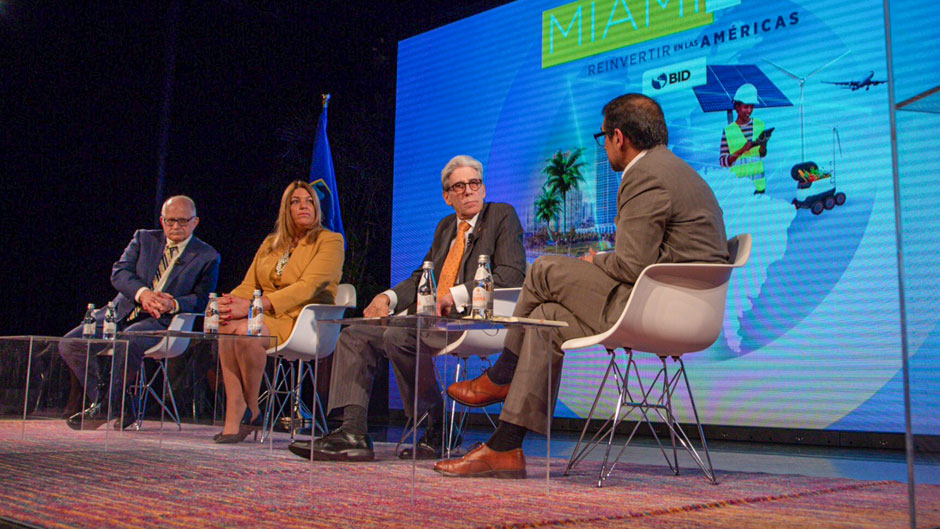The process was lightning fast, and with the death toll rising around the world, it needed to be. In less than a year, scientists had developed a vaccine against SARS-CoV-2, the virus that causes COVID-19.
Advancements in vaccine science, however, were not the only positives spurred by the pandemic. COVID-19 also accelerated a digital revolution in higher education that has given students a new way to learn.
“For whatever reason, education was one of the very few fields of human endeavor that did not undergo a technological revolution in the 20th century compared to medical care or transportation. That revolution is happening now,” University of Miami President Julio Frenk said Thursday during the hour-long panel, “Human Capital in a Digital Economy: The Role of Higher Education.”
Held at the Light Box at Goldman Warehouse in Wynwood, the discussion was part of Miami-LAC, a three-day forum on trade and investment opportunities between South Florida and the Latin American and Caribbean (LAC) region.
Speaking on a panel that included Mark Rosenberg and Madeline Pumariega, presidents of Florida International University and Miami Dade College, respectively, Frenk said that with “the convergence of high-quality, online mixed reality of simulation technologies, we are finally on the cusp of that technological revolution that will completely reshape higher education.”
And he singled out three factors to explain why that revolution is occurring—advancements in cognitive science that allow us to understand how we learn, digital technologies that are finding applications in the world of education, and students who are graduating into the most dynamic labor market in history—where new jobs are being created and existing occupations are being disrupted.
As such, Frenk said, “we can no longer sustain the model where we front-load educational content and competencies.” Institutions of higher education, he noted, must redefine themselves “as providers of educational services throughout the entire career cycle of people, not just before people join the labor market but during and even after.”
Responding to questions posed by Marcelo Cabrol, manager of the social sector at the Inter-American Development Bank, which hosted the conference, the three panelists discussed ways in which the pandemic affected their institutions and the strategies they employed to deal with them.
The University of Miami, for example, migrated 1,700 courses to an online format within 10 days. “It was not a permanent solution. It was a response to an emergency,” Frenk pointed out. “But the big contribution of the pandemic was the cultural change it accelerated. Faculty [members] who were resistant to such technology—particularly online media—in their instruction finally embraced it and actually started loving it. In those 10 days, we made more progress in cultural change than in the previous 10 years. It’s a moment we can’t let go of.”
For Pumariega, it was about finding a “silver lining in the storm.”
“That silver lining was the ability of community colleges to adopt additional instructional modalities,” she explained. “Within a week, we went into online modalities, we went into live Zoom modalities. Our faculty came on board. And what it did was break down the silos that might have existed in our institution.”
The pandemic, she continued, allowed Miami Dade College to learn just how vulnerable community college students are, whether it be in housing and food insecurity or the digital divide. “We needed to quickly move our support services virtually,” she said, referring to the college’s mental health counseling and academic tutoring services. “We were [the students’] lifeline, and we demonstrated our nimbleness.”
The panelists shared their views on how educational systems in Latin America and the Caribbean can learn from what their institutions experienced during the pandemic.
“I don’t think there’s any doubt that we, as universities, have lost our monopoly on higher education,” Rosenberg said. “That may not be a bad thing. In fact, the diffusion of learning is a key issue for the 21st century, and democratizing learning is very important. So, it’s probably a good thing that there’s much more competition—for who teaches and how people learn—than ever before.”
Frenk addressed strategies to attract more women to STEM and high-tech fields, saying that colleges and universities must commit to reaffirming the role of higher education as the most legitimate instrument to propel upward social mobility. “Any group that’s been marginalized—women, communities of color, poor families and households—we need to deliberately seek them out and open the pathways of access and then assure an environment that’s respectful,” he said.
Recruiting women and other underrepresented groups is not enough, Frenk said. An internal environment where they feel valued at every point needs to be created, he added.
Frenk also called for more paid internships in the STEM fields for impoverished students and women. And he provided an outlook for the next five years, saying that a “connective” university is the future of education.
“Not a closed system, not a system of privilege, not a system of further stratification, but a connector between opportunity and prosperity,” Frenk explained. “And I would call that the essential university.”

